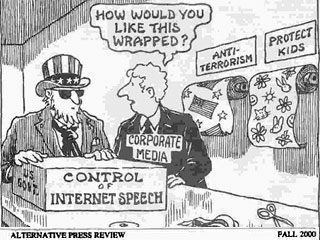By curtailing the powers of the spy agencies, we could restore the internet to its original functionality and openness while maintaining the right to privacy and free speech – but maintaining a 20th-century copyright/IP model at the same time is impossible. Or we could give up our privacy and other civil rights to allow specific protected industries to carry on coining it in. A last option would be to switch off the internet. But that is not realistic: modern countries could not survive a day without the internet, any more than they could function without electricity.
As a society, we’re going through the painful realization that we can only have two out of the three options. Different corporatist interest groups would no doubt make different choices but, along with the vast majority of the people, I opt for the internet and privacy as both a free channel for communication and the free transfer of useful information.
Like any social change (the abolition of slavery, universal suffrage), this is also accompanied by heated arguments, legal threats and repression, and lobbyist propaganda. But historically, all this sound and fury will signify…precisely nothing. Maybe at some point, basic civil rights will make a comeback, upheld by the legislature and protected by law enforcement.
The choice is simple: internet, privacy, copyright. We can only choose two, and I know which I choose.
Website pagination: Stories should load into a single page every time
I don’t disagree that these are nice benefits from pagination. But I think that thoughtful design can improve how long articles look on the Web. One example of this is the Verge, which publishes very long pieces every day and makes them look stunning and manageable without page breaks. In its long pieces, the Verge breaks up blocks of text with photos and design elements like pull-quotes, and each article has internal navigation buttons that let you go to specific sections of the piece. (In this review of the new Kindle, for instance, you can click on “Hardware” or “Software, battery” to scroll directly to those topics.)
I asked Joshua Topolsky, the Verge’s editor, whether he had a hard time convincing the advertising sales department at the magazine to ditch pages. He said he didn’t: “From the beginning, there’s been a company-wide belief that we can marry great advertising with great content and not have to cheat or trick our users,” Topolsky emailed. “And so far, that’s proven 100 percent correct. Our traffic has been on a big climb, and I believe advertisers are really beginning to see the true value in engaged users who care (and return) versus sheer volume of pageviews (though our pageviews have also been through the roof).”
The story of Fernforest and Petro Dale
“However, the attempt to ban cars caused Petro Dale to wake up to the threat of railways. They realized that even though much more commerce took place with cars and roads, and even though railways were becoming increasingly irrelevant, they would remain a potential regressive threat. In the past Petro Dale had sought to do business with the incumbent food network distributors, suggesting ways of taking the mass market food produce and distributing it to new franchises like mobile food trucks and fast food restaurants. They were spurned. Now they realized that trying to work with Fernforest was not just futile but harmful.”
How the internet displaced/will displace the old media distributors/publishers, in a nice metaphor story. The funny bit is even if the current MPAA, RIAA and their associates management personnel read it, they wouldn’t understand it.
Won’t someone think of the children?

Source unknown
Cutting the Cord on Cable
“Dear Cable:
Before I say anything else: It’s not you. It’s me.
I’ve changed over the years. I’m hardly at home. And when I am, it’s not live television I’m watching. It’s stuff that’s been queued up on my DVR for weeks. But mostly, when I’m on my couch with a remote in my hand, I’ve been…streaming. I know how wrong that must sound. But everyone’s getting their shows and movies through the Internet these days. I’m sorry. It’s just the reality of things.”
Why GoDaddy hasn’t earned my forgiveness
“What GoDaddy did was support a bill that violates civil liberties and threatens the future of he Internet as we know it—the Internet that GoDaddy relies on for revenue. Supporting the bill demonstrates a major lack of understanding of how the Internet works, and a serious disregard for customers.
I’m sorry if I am not impressed that GoDaddy dropped its support for SOPA under duress. I’d rather do business with a domain registrar that didn’t have the audacity (stupidity) to support SOPA in the first place.”
Qwiki
Despite the bad pronunciation of the Portuguese names (which is usual for a automated text2speech engine) i loved the graphics and presentation of this thing. Not sure about its usefulness on the long run, once the “wow factor” has rune dry though.
See it on fullscreen.
And yes, it’s my hometown! How better can it get?
